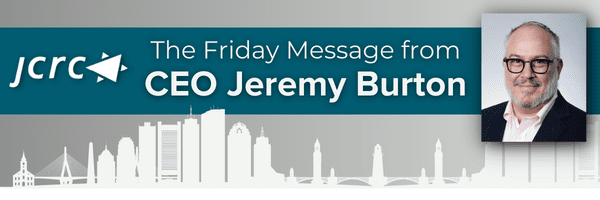Tonight, as we start Shabbat, we also arrive at the 17th of Tammuz on the Jewish calendar. This fast day (observed on Sunday) commemorates when, after a prolonged siege, Roman legions breached the walls of Jerusalem in 70 CE. This date begins the “three weeks,” a period of collective Jewish mourning leading to the 9th day of Av. Tisha B’Av commemorates five calamities – among them the destruction of our first Temple in Jerusalem in 586 BCE, the destruction of the second Temple following a pitched battle through the streets of the city for three weeks after the breach of the walls in 70 CE, and the crushing of the “Bar Kokhba revolt” against the Romans in 135 CE.
There are many access points from which to reflect on this history; Jews in every time and place have lifted up the particulars of this period that are meaningful to their own moment. For many, it is meaningful to focus on the Talmudic teaching that the second Temple was destroyed because of baseless hatred between the Jews (or by some interpretations, between Jewish leaders) of that time. We may take inspiration from the psalmist, mourning the first Temple “by the rivers of Babylon” and find meaning in those earliest efforts to adapt Jewish identity to a diasporic experience that refused to forget Jerusalem and that yearned for a homeland.
Over time, this period in our calendar has been connected to the memory of numerous calamities – those that happened precisely on 9 Av, or those that happened more generally in high summer, which has been a historically bad time of year.
The first Crusade began with the slaughter of 10,000 Jews in France in that Av, August 1096. The Jews were expelled from Spain in the first week of Av, at the end of July 1492. The first World War, and the horror and disruption that built toward the Shoah, began on 9 Av, in August 1914.
Today we live in what is, by any measure, a trying time. There is so much hatred and division. There is a genuine and persistent threat to our societal institutions. The very stability of our society that we have long accepted, maybe naively, is no longer a given. More particularly, there are genuine challenges to the unity of the Jewish people and to our shared sense of collective purpose. Our safety is threatened around the world. Our ability to engage with civility in our disagreements with each other is sorely tested.
After reviewing the long list of calamities that we mark at this time of year, I am sitting with the remarkable continued vitality of our people through the millennia. Any community that has endured what the Jewish people have, time and again, for over 2,000 years, should – logically – no longer exist. And yet we do.
We exist and we thrive because of people like Rabbi Yohanan ben Zakkai, a “hero” of Tisha B’Av. He perceived the coming crisis and he chose to negotiate with the Romans. He could not save the Jewish commonwealth, but he secured the town of Yavne and established a community of study there where, surrounded by students and with the generations that would follow him, he re-imagined and re-invigorated Judaism for a post-Temple world. His vision, willingness to negotiate with the enemy, and ability to adapt, set the groundwork for what we now know as “rabbinic Judaism.”
There’ve been other heroes throughout the ages, those who challenged our oppressors, those who negotiated with our enemies, and those who guided our people to rise from the ashes. What they have had in common is their belief in the resiliency of our people; a resiliency that comes from understanding history, from not being afraid to hold an analytical eye to current affairs, and from opening their imaginations to the knowledge that the “worst” outcome is always a possibility. But also, a resiliency that comes from knowing that we’ve survived and thrived, and that through our ability to prepare, resist, and adapt, we continue to see a future of hope, including – as for the weeping psalmist by the rivers of Babylon – our hope and faith in our return to Jerusalem.
Shabbat Shalom,
Jeremy




